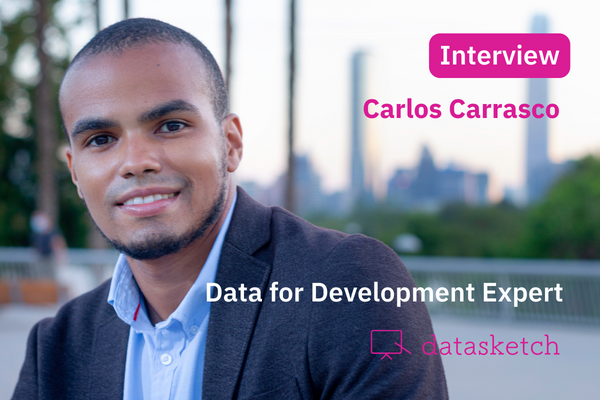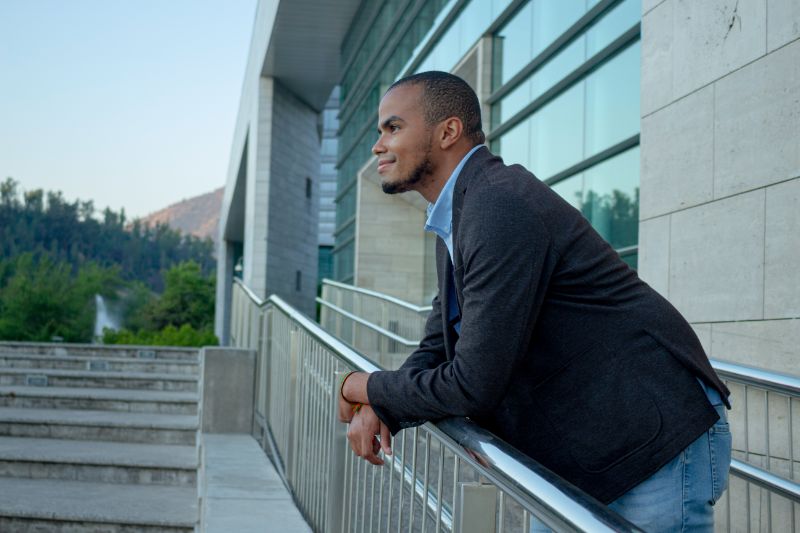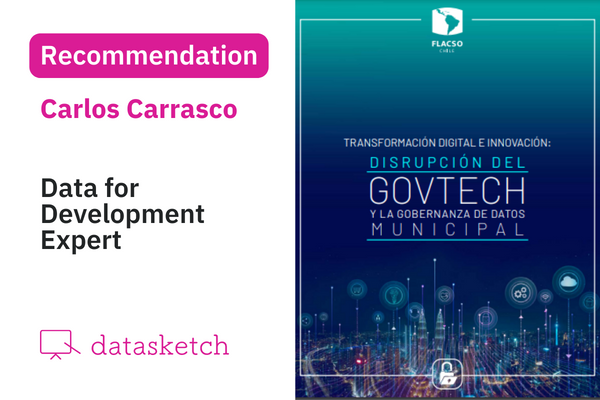Carrasco: "To talk about data protection is also to talk about redistribution"
Carlos addresses the challenges of data use in municipalities.
Available in:

We spoke with Carlos Carrasco. He is an expert in the use of data for development. He tells us about his career and the possibilities data offers to improve democracy. The challenges for the use of data and some actions that can be taken by civil society.
Tell us about your career. In it, what has brought you closer to data and open government?
What brought me closer to data and open government has been my passion for politics. It may seem strange to answer through passion about something technical, but I think it is part of the human condition, which has to do with connecting with what we are passionate about.
I come from the world of student leadership and social and political activism in Venezuela, and later I co-founded the foundation Caricuao Propone. Caricuao is a popular area of Caracas and an indigenous name. There, for almost four years I worked for my community on issues related to municipal public policies.
Afterward, I had the opportunity to collaborate as a research assistant in some projects with the Universidad Católica Andrés Bello in Caracas, from which I graduated. Through this, I applied and obtained a scholarship for a digital government and open government course from ECLAC and the Spanish Cooperation Agency in its training center in Santa Cruz in Bolivia.
Due to the humanitarian circumstances that Venezuela was going through, I decided to emigrate to Chile. I started working at the Observatorio del Gasto Fiscal, a non-governmental organization monitoring public spending in Chile. It does this through open data and openness of information. So I started to specialize in how we can use open data to audit, make visualizations and, most importantly, make people understand how public resources are used and the need for oversight through civil society, academia, and even the participation of the private sector.
In my career I have reaffirmed my conviction for democracy, for digital transformation and that we need more people who have the technical and political capacity to respond to the demands we face today at a global level, especially in Latin America and the Caribbean and in the Ibero-American region, where we have particular challenges and where we have not yet taken advantage of technology to its fullest capacity.
Many speak of transhumanism. Without falling into science fiction, I believe we are going to a future where the biological and the digital will be intimately linked. Talking about open data, and open government, that change in the paradigm of democracy brings us much closer to that future that is on the horizon.
Data are already part of everyday life, but work still needs to be done. What actions could we take to help us strengthen democracies in Latin America and the Caribbean?
I have been taught that democracy cannot be understood separately from development. If we do not understand technology as an enabler but simply as a means or an instrument, we will not have the capacity to effectively understand what it is giving us. This is the opportunity to reconfigure and rethink our democracies.
The proposals that we can generate from an open data approach have to do with structural issues and with a change in the paradigm of how we are thinking about things:
We have to aim to reduce digital gaps comprehensively, with training and with greater availability of technological tools. This will allow excluded sectors in many of our countries to be incorporated into the knowledge society and participate in a much more democratic society.
A concrete proposal is to invest in infrastructure for connectivity. Only in this way will we incorporate more people with the capacity to make decisions into this digital society and, in a certain way, also monitor how the State is doing its job.
Another related line is a change in the paradigm: always have people at the center of the digital transformation. We must understand that our platforms and technological advances are a service to society. Technology has to adapt to us, to our needs, dreams, and challenges.
It is also necessary to have a data protection framework that allows us to share information while knowing how it is used. These are complicated conversations, but we must consider reducing inequality by taking advantage of new technologies that intervene in economic, social, and political relations. To talk about data protection is also to talk about redistribution, about people receiving some kind of benefit.
On the other hand, it is necessary to involve people in implementing public policies, not only in consultation or design. It is necessary to devise ways supported by technology so that people can be incorporated into concrete public policies. This helps to rescue public value and strengthens democratic institutionality.
We must decentralize our communication channels in the States through homogeneous and coordinated channels. Let us try to think about how, regardless of whether I go to the Ministry of Finance, the Ministry of Housing, or my municipality, we can find similar channels. This concerns the design and a similar legislative framework, allowing me to trace my communication with my government and representatives.
To conclude, I believe that democratic deliberation should not give way to the immediacy of technology. I believe that society’s frustration is not that there are democratic or tough debates in some instances but that the materialization of the decisions is often poorly executed or not executed at all.

Could you mention an action that is a priority to consolidate a culture of open governance in the municipalities for you? From civil society how could we help make it happen?
I believe that the municipal space is a laboratory that we must continue to take advantage of for innovation and to establish a new relationship between citizens, institutions, and companies that can face inequality.
I believe that the municipal space is a laboratory that we must continue to take advantage of for innovation and establish a new relationship between citizens, institutions, and companies that can confront inequality.
In this sense, when discussing open data, municipalities should legislate so that the neighbors are co-owners of the data and receive a benefit when the private sector uses their personal data. If the private sector uses the data for advertising, the neighbors should receive some kind of benefit or money directly, improving their quality of life. This, in the best case, has to be something global. We must start small. And I think the municipal with local or subnational companies can be a first option.
Regarding what can be done by civil society, I believe that civil society has the duty, especially those with technical knowledge, to interpellate and train local representatives on open data and open government issues. We must be able to teach the politicians representing us what open data is about and what documents can be understood as open and accessible data for citizens. Civil society, supported by academia, has to teach, train, and, why not, also question so that technology ceases to be the vision of a niche and becomes an integral part of the political vision at the time of public management.
You have been a consultant for Chile for the Latin American Open Data Barometer and the Global Data Barometer. Beyond the results, what do you highlight from the research process and the work you did?
These indexes are very good for measuring the availability of information and whether or not it is in an open format. But now the most important challenge we have is to try to measure whether and how these open data are used At the end of the day, it will not help us if the public institutions of the countries have an open data portal if these data are not being used.
What many governments do is that they open data and create open data portals, but then they do not follow up on them. In the worst-case scenario, you have open data portals in the region that were opened at some point but are now outdated. Other portals, indeed, are updated year by year or even month by month, but we do not know how that information is being used, and we do not know if, in the end, it is generating some kind of public value or usefulness to society.
This is where we should focus now, on knowing if open data is being used and in what way.
and what it is being used for. We must understand that open data and the effort to open them is made with public money, that is, everyone’s money. It is important to check if they serve society or if nobody is looking at them. And if no one sees them, we should ask ourselves why, what do we need to do to use them more? That is one of our challenges when discussing these kinds of barometers.
In addition to that, we have a challenge with homogeneity. I think we have to recover a bit of that vision we had in the 20th century, the efforts of ISO, the International Organization for Standardization, which allow us to standardize processes. If we want to move towards a greater exchange of data at a global level, this has to be standardized. Unfortunately, at the moment, we do not have standardized information, especially in the Latin American and Caribbean region. Thinking about an open data ISO should be something we should consider in the future so that we can have a greater exchange of information between countries. Whether from Chile, Venezuela, Mexico, or Spain, I know a series of metadata will be the same; therefore, I can analyze that information.
Tell us about a data or organizational openness project you have promoted or inspired you recently and why it is relevant to you.

I would like to talk about a project I worked on last year, a publication done in conjunction with Flacso Chile and Fundación Abriendo Datos. It is called Innovation and Digital Transformation, Govtech Disruption and Municipal Data Governance.
It seems to me one of the most interesting efforts in recent times, as it presents a scenario of the Govtech ecosystem. When we talk about Govtech, we are talking about how to generate ventures that provide solutions coupled with the use of technology, digital technology and that can contribute to fundamental aspects of public management from an open government framework, such as transparency, data governance, and citizen participation.
In that publication, I had the opportunity to write a chapter called “Preliminary Public Policies for the Fourth Industrial Revolution in Latin America”, which shares proposals to generate conditions that allow a paradigm shift in how digital transformation is being addressed in the region and how this can contribute both for public institutions, but also for productivity. It must be understood that Latin America and the Caribbean have not solved their old problems within the framework of technological advances.
We have a productivity problem, where after the rebound effect of 2022 due to the post-pandemic, we are facing 2023 with stagnation, where many of the countries in the region will grow very little and some will even go into recession.
If we understand, in this context, that democracy cannot be separated from development, it is important that we take advantage of these reflections on technology and move towards this digital knowledge society to propose new solutions. In this chapter, I share some proposals that can be taken to reduce the digital gaps and promote an intervention plan that can invite the various actors at multiple levels in the training, implementation, and monitoring of some digital technologies.
In this book, you will find very interesting chapters on pilot cases on Govtech indexes in Chilean municipalities, how we can generate smart communities through social innovation, and how we can understand the digital transformation combined with this whole paradigm of smart cities.
I think there is an opportunity that we have to take advantage of to be a bit like evangelists of a paradigm of digital, open, and democratic government.




